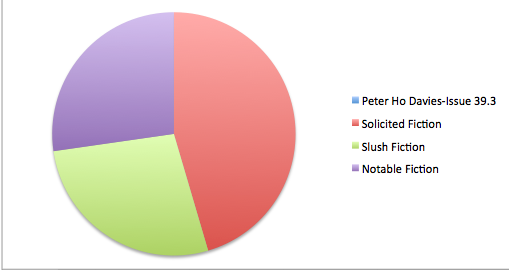From the Slush Pile: The Numbers
When I see numbers I generally shut down, but I know there’s a whole host of you out there who want to see pie charts, graphs and digits. So if my ranting about pluck and resiliency isn’t enough for you folks, here are the cold hard facts when it comes to submissions to Ploughshares.
We publish three issues a year. Two are guest edited, and the Winter issue is staff edited (by Ladette Randolph, Editor-in-Chief; Margot Livesey, Fiction Editor; and John Skoyles, Poetry Editor). For each guest-edited issue (Spring and Fall), fifty percent of the content is solicited. That means the guest editor asks writers of his/her choice for about ninety pages of material, while the remaining ninety pages are derived from a short list of submissions that the office provides. The short list is made up of unsolicited material submitted to the office, and includes a mix of slush and notables. (“Notable” is a term we use to describe manuscripts by those who have substantial publishing credits in major journals or books by major presses.) The short lists’s ratio of slush to notables is about 50/50; if you don’t believe me, check it out the breakdown of our current issue, all fiction, guest edited by Peter Ho Davies:

In regards to the Winter issue, Randolph explains, “Although the staff editors sometimes (rarely) invite writers they admire to submit work for consideration in the staff-edited issues, these issues are gathered entirely from work submitted directly to the magazine and are almost always composed of unsolicited pieces.” So that’s an extra ninety pages where your work might find a home.
More good news for writers battling their way out of the slush pile is that we’ve recently undergone a change in our review policy. Pass-ons from the slush pile now go directly to the genre editor. They used to get passed on to a senior reader for an effective double screen, but now we’ve cut out the middleman. That means if you can wow your way out of the slush pile, then your next reader is a decision maker.
The bad news is that Ploughshares receives about 11,000 submissions a year. In the three issues published for 2013 it looked likes this:
- Writers Published: 96
- Fiction: 27
- Poetry: 65
- Nonfiction: 2
- Women: 55 (fiction: 16)(poetry: 37)(nonfiction: 2)
- Men: 41 (fiction: 11)(poetry: 30)
Clearly, the poets have an advantage—not because we like poetry better but because poetry has a lower page count. And nonfiction writers, don’t be upset. You may have been in the minority this year, but Patrica Hampl’s Fall 2012 issue was dedicated to nonfiction only, with eighteen separate pieces. (And, we usually include a couple nonfiction pieces on the prose short list for our guest editors.)
Another note about the guest editor policy: while many submitters try to write for a specific guest editor, the timing doesn’t work like that. We are like the fashion industry in that we generally read a season ahead. So don’t hope that your particular sensibility will speak to a specific guest editor, because odds are, we already sent a short list to that editor long before you even decided that they would be the perfect reader for your writing. As I’ve said before, the best thing you can do to get an editor’s attention here is send us your best work and let the words speak for themselves.


